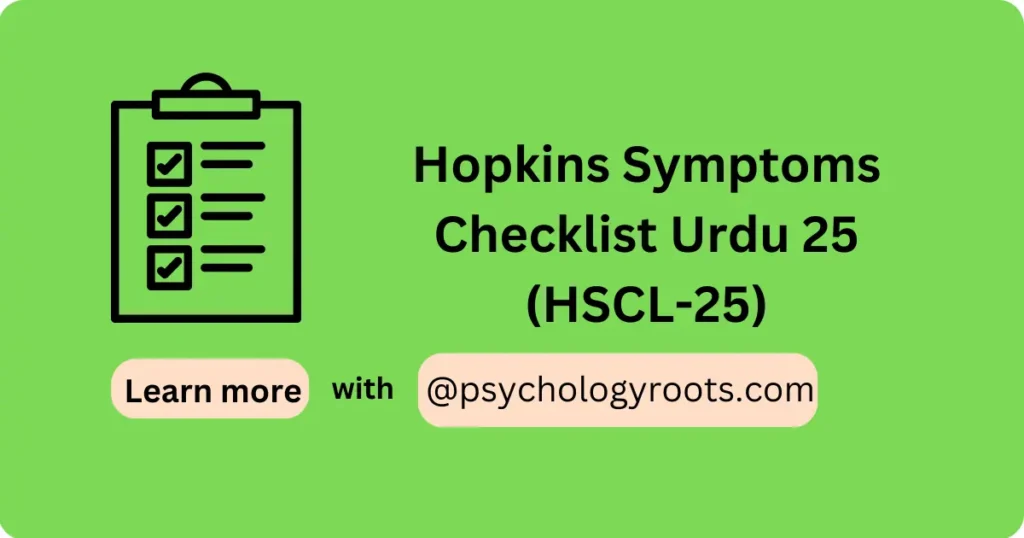Table of Contents
Hopkins Symptoms Checklist Urdu
Here in this post, we are sharing the “Hopkins Symptoms Checklist Urdu”. You can read psychometric and Author information. We have thousands of Scales and questionnaires in our collection (See Scales and Questionnaires). You can demand us any scale and questionnaires related to psychology through our community, and we will provide you with a short time. Keep visiting Psychology Roots.
About Hopkins Symptoms Checklist Urdu
Scale Name
Hopkins Symptoms Checklist Urdu 25 (HSCL-25)
Author Details
A.A. Halepota,S.A. Wasif
Translation Availability

Background/Description
Depression and anxiety pose significant challenges to mental health, especially in populations affected by trauma and torture. Accurately identifying these conditions is crucial for providing effective treatment and improving well-being. However, language barriers can hinder reliable assessment, particularly in regions where English isn’t readily spoken.
Recognizing this need, researchers and mental health professionals in Pakistan undertook the crucial task of translating the widely used Hopkins Symptoms Checklist 25 (HSCL-25) into Urdu. This instrument, originally developed in English, measures symptoms of anxiety and depression through 25 brief questions. Its effectiveness in English led to its translation into various languages, including Urdu, to cater to populations who primarily communicate in that language.
The Urdu translation of the HSCL-25 plays a vital role in mental health assessments in Pakistan and other Urdu-speaking regions. It enables mental health professionals to efficiently screen for symptoms of anxiety and depression among individuals who might not be comfortable expressing themselves in English. This allows for earlier identification of these conditions, potentially leading to improved intervention and recovery rates.
The translation process itself wasn’t merely a linguistic exercise. A team of qualified professionals, including psychiatrists and linguists, ensured the accuracy and cultural sensitivity of the Urdu version. The questions were meticulously translated while preserving the original meaning and nuances, ensuring reliability and consistency with the English HSCL-25.
Administration, Scoring and Interpretation
- Urdu HSCL-25 questionnaire: Use a validated and authorized version, ensuring accuracy and cultural sensitivity.
- Pencil or pen: Provide participants with a comfortable writing tool.
- Instructions (optional): If needed, prepare clear and concise instructions in Urdu explaining the purpose and procedure of the HSCL-25.
- Introduction: Briefly introduce yourself and explain the purpose of the HSCL-25, emphasizing confidentiality and voluntary participation.
- Consent: Obtain informed consent from the participant before proceeding.
- Instructions: Review the instructions with the participant, clarifying any doubts or questions. You may choose to read the instructions aloud or allow them to read them independently.
- Questionnaire administration: Provide the Urdu HSCL-25 questionnaire and instruct the participant to read and answer each question carefully. Emphasize honesty and accuracy in their responses.
- Clarification: If needed, offer clarification on any questions, but avoid influencing the participant’s answers.
- Scoring: Once completed, collect the questionnaire and score it according to the established guidelines for the Urdu version.
Reliability and Validity
The reliability and validity of the Hopkins Symptoms Checklist 25 (HSCL-25) in Urdu, like any translated instrument, requires careful consideration. Here’s a breakdown of the existing research and considerations:
- Internal consistency: Studies in Pakistan have shown good internal consistency for the Urdu HSCL-25, indicating consistent responses within the anxiety and depression subscales.
- Test-retest reliability: Limited research exists on test-retest reliability, meaning the consistency of scores over time in Urdu. More studies are needed in this area.
- Concurrent validity: Moderate correlations have been found between the Urdu HSCL-25 and other validated Urdu measures of anxiety and depression, suggesting good concurrent validity.
- Construct validity: Evidence for construct validity, meaning the tool measures what it intends to, is emerging. Studies have shown the Urdu HSCL-25 can discriminate between healthy and clinical populations as well as between anxiety and depression.
Available Versions
25-Items
Reference
Halepota, A. A., & Wasif, S. A. (2001). Hopkins Symptoms Checklist 25 (HSCL-25) Urdu translation: an instrument for detecting anxiety and depression in torture and trauma victims. JOURNAL-PAKISTAN MEDICAL ASSOCIATION, 51(7), 255-257.
Important Link
Scale File:
Frequently Asked Questions
What is it?
Urdu translation of a tool to assess anxiety & depression symptoms.
Who uses it?
Mental health professionals in Urdu-speaking regions.
How is it administered?
Answer 25 questions in a quiet, private setting.
Is it accurate?
Shows promise, but further research needed. Best used with professional judgment & cultural sensitivity.
Disclaimer
Please note that Psychology Roots does not have the right to grant permission for the use of any psychological scales or assessments listed on its website. To use any scale or assessment, you must obtain permission directly from the author or translator of the tool. Psychology Roots provides information about various tools and their administration procedures, but it is your responsibility to obtain proper permissions before using any scale or assessment. If you need further information about an author’s contact details, please submit a query to the Psychology Roots team.
Help Us Improve This Article
Have you discovered an inaccuracy? We put out great effort to give accurate and scientifically trustworthy information to our readers. Please notify us if you discover any typographical or grammatical errors.
Make a comment. We acknowledge and appreciate your efforts.
Share With Us
If you have any scale or any material related to psychology kindly share it with us at psychologyroots@gmail.com. We help others on behalf of you.